

Is it really always only the others who are to blame? GP’s view on medical overuse. A questionnaire study. Abstract Background Medical overuse is a common problem in health care.
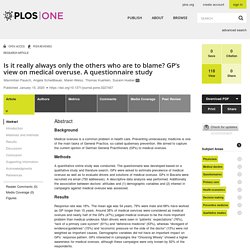
Preventing unnecessary medicine is one of the main tasks of General Practice, so called quaternary prevention. We aimed to capture the current opinion of German General Practitioners (GPs) to medical overuse. Methods A quantitative online study was conducted. Results Response rate was 18%. Discussion Medical overuse is an important issue for GPs. Citation: Pausch M, Schedlbauer A, Weiss M, Kuehlein T, Hueber S (2020) Is it really always only the others who are to blame?
Editor: Monika R. Received: August 15, 2019; Accepted: December 18, 2019; Published: January 15, 2020 Copyright: © 2020 Pausch et al. Data Availability: All relevant data are within the paper and its Supporting Information files. Funding: The authors received no specific funding for this work. Competing interests: The authors have declared that no competing interests exist.
Introduction Medical overuse is a common problem in health care [1, 2]. Measures A. Pharmacists uniquely poised to reduce unnecessary prescriptions. Two recent articles, one by and another , highlight the problems associated with polypharmacy, the term for taking many different medications daily.
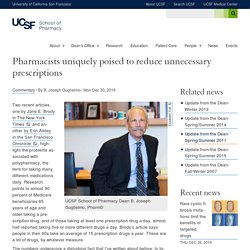
Research points to almost 90 percent of Medicare beneficiaries 65 years of age and older taking a prescription drug, and of those taking at least one prescription drug a day, almost half reported taking five or more different drugs a day. Brody’s article says people in their 60s take an average of 15 prescription drugs a year. These are a lot of drugs, by whatever measure. Martin Marshall: GPs need to do less, but it’s not what patients want to hear. The NHS does too much medicine”.
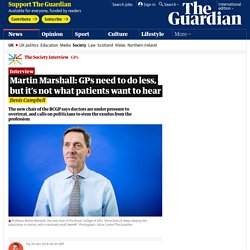
These are surprising words to hear uttered by a GP, given their role as gatekeepers to the NHS – the doctors who send patients to hospital for tests, surgery or other treatment. But Martin Marshall, the new chair of the Royal College of General Practitioners, firmly believes that part of the reason the NHS is so overstretched is that doctors (GPs and hospital doctors) overdiagnose illness – and as a result patients have too many exploratory tests and too many unnecessary treatments.
Getting a grip on that, he believes, would help relieve the pressure on the health service in general and the nation’s overworked family doctors in particular. Marshall, 58, has just begun a three-year stint as the profession’s leader and main mouthpiece, replacing Helen Stokes-Lampard. He believes “medicine has overstretched itself” and its limits need to be “rethought”, to be scaled back. Socioeconomic status and benzodiazepine and Z-drug prescribing: a cross-sectional study of practice-level data in England.
We use cookies to enhance your experience on our website.By continuing to use our website, you are agreeing to our use of cookies.
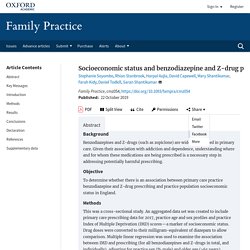
You can change your cookie settings at any time. <a href=" Find out more</a> Skip to Main Content. The U.S. Leads the World in Health-Care Spending. It was in his self-neglect, rather than his hostility, that my father found common cause with the tens of millions of American patients who collectively hobble our health-care system.
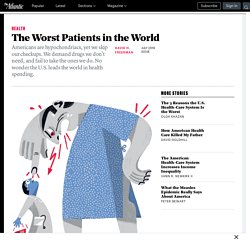
For years, the United States’ high health-care costs and poor outcomes have provoked hand-wringing, and rightly so: Every other high-income country in the world spends less than America does as a share of GDP, and surpasses us in most key health outcomes. Recriminations tend to focus on how Americans pay for health care, and on our hospitals and physicians. Surely if we could just import Singapore’s or Switzerland’s health-care system to our nation, the logic goes, we’d get those countries’ lower costs and better results. Where to draw the line between mental health and illness? Defining mental disorders and illnesses is not straightforward.
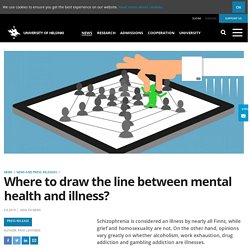
Notions of whether a certain phenomenon should be classified as an illness or disorder, or something falling within the category of normal emotional fluctuations or personality traits, have changed significantly over the years, and continue to do so. In a study carried out with a Finnish dataset, an international group of researchers looked into which mental conditions from a group of 20 were considered illnesses and which were not by five different groups of people. The questionnaire was distributed to 6,200 individuals, of whom 3,000 were Finns chosen randomly from the Population Register. The rest included 1,500 physicians – a number of psychiatrists and other specialists – 1,500 nurses and, in addition, all of the 200 members of the Finnish Parliament. The Role of Disease Labels in Patient Perceptions and Treatment Decisions. Key Points Question What role does disease label play in patients’ treatment decision making in the setting of low-risk epithelial malignant neoplasms such as papillary thyroid cancer?
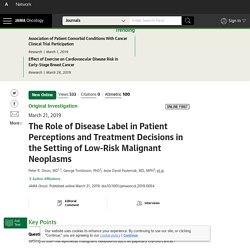
Findings The disease labels cancer, nodule, and tumor played a considerable role in patient decision making, with participants willing to accept a 4-percentage-point increased risk of progression or recurrence (from 1% to 5%) to avoid their disease being labeled as cancer in favor of nodule. The strength of the preference for the nodule label instead of cancer was similar to the preference for active surveillance instead of surgery. Meaning Omitting the word cancer from the disease label of low-risk epithelial malignant neoplasms may reduce overtreatment. Importance The cancer disease label may lead to overtreatment of low-risk malignant neoplasms owing to a patient’s emotional response or misunderstanding of prognosis. Too much medicine: not enough trust? Dilemmas of medical overuse in general practice - A focus group study. - PubMed - NCBI. Medical Overuse as a Physician Cognitive Error: Looking Under the Hood. Medical overuse, or health services for which potential harms outweigh benefits, is common and persistent.
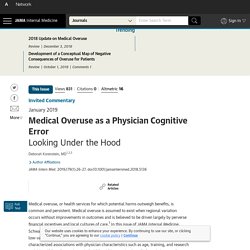
Medical overuse is assumed to exist when regional variation occurs without improvements in outcomes and is believed to be driven largely by perverse financial incentives and local cultures of care.1 In this issue of JAMA Internal Medicine, Schwartz and colleagues2 quantified variations in primary care physician provision of low-value services (largely representing overuse) among Medicare beneficiaries and characterized associations with physician characteristics such as age, training, and research activities. Although practice varied widely within organizations, little variation was due to observable physician characteristics. Half of older patients exposed to potentially inappropriate prescribing. Around half of older patients are exposed to potentially inappropriate prescribing, each year, and hospitalisation is independently associated with an increased risk, finds a study in Ireland published by The BMJ today.
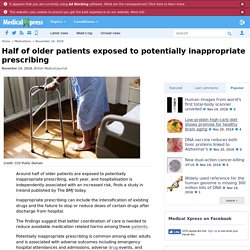
Inappropriate prescribing can include the intensification of existing drugs and the failure to stop or reduce doses of certain drugs after discharge from hospital. The findings suggest that better coordination of care is needed to reduce avoidable medication related harms among these patients. Potentially inappropriate prescribing is common among older adults and is associated with adverse outcomes including emergency hospital attendances and admissions, adverse drug events, and poorer quality of life. Yet research to date has focused on characteristics of patients and general practitioners as risk factors for poor prescribing quality. Breaking good news: an essential skill for avoiding too much medicine? Physician Characteristics Associated With Ordering 4 Low-Value Screening Tests in Primary Care. Looking for trouble? Diagnostics expanding disease and producing patients - Hofmann - 2018 - Journal of Evaluation in Clinical Practice. Novel tests give great opportunities for earlier and more precise diagnostics.
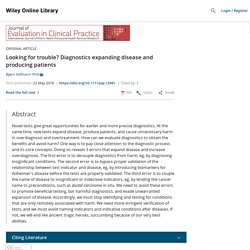
At the same time, new tests expand disease, produce patients, and cause unnecessary harm in overdiagnosis and overtreatment. How can we evaluate diagnostics to obtain the benefits and avoid harm? One way is to pay close attention to the diagnostic process and its core concepts. Its-hard-for-doctors-to-unlearn-things-thats-costly-for-all-of-us. RACGP - Managing de-implementation in general practice. Drivers and strategies for avoiding overuse. A cross-sectional study to explore the experience... - Europe PMC Article - Europe PMC. Four ways to shift the culture of overuse - Lown Institute. If you’re a regular reader of our blog, you know that medical overuse is a widespread, costly, and harmful problem.
At least 20% of all health care spending goes towards treatments, drugs, tests, or surgeries that patients do not need, wasting hundreds of billions of dollars and sometimes causing serious complications for patients. Clinicians themselves recognize that overuse is prevalent. In a 2017 survey of physicians, on average doctors estimated that 20.5% of care provided in their specialty is unnecessary. However, even for doctors who want to reduce overuse, there are still plenty of barriers to providing the right care, including perceived patient demand, fear of malpractice suits, safety concerns, and discomfort with uncertainty. In a new article in the Journal of Patient Safety, medical students at the Icahn School of Medicine Sara Pasik and Sigal Israilov, chief of internal medicine at the Memorial Sloan Kettering Cancer Center Dr.
Small area variations in health care delivery. - PubMed - NCBI. Location Matters. Patients with common conditions such as back pain, headaches and upper respiratory infections are more likely to receive tests and services of uncertain or little diagnostic or therapeutic benefit—so-called low-value care—when they seek treatment in primary care clinics located at hospitals rather than at community-based primary care clinics, according to a nationwide study led by researchers at Harvard Medical School and the David Geffen School of Medicine at UCLA.
The key factor driving this disparity appears to be clinic location rather than clinic ownership, the research showed. Indeed, aside from referring patients to specialists slightly more often, hospital-owned community clinics delivered care otherwise similar to physician-owned community clinics. Get more HMS news here. Are demanding patients driving the epidemic of unnecessary medical care? Posted By Kevin Lomangino is the managing editor of HealthNewsReview.org. He tweets as @KLomangino. The Barrier to Informed Choice in Cancer Screening: Statistical Illiteracy in Physicians and Patients. Chapter First Online: Part of the Recent Results in Cancer Research book series (RECENTCANCER, volume 210) Exploring unnecessary invasive procedures in the United States: a retrospective mixed-methods analysis of cases from 2008-2016. Care variations are costing hospitals millions, and time is running out to fix it.
Unnecessary variations in care is costing hospitals millions every year, and hospital looking to stay open, let alone competitive are looking to address this complex and pressing issue, say experts from the Advisory Board. The Congressional Budget Office as projected that 60 percent of hospitals will have negative profit margins by 2025 if they don't boost productivity and/or cut costs, and according to an Advisory Board survey, health system chief financial officers view clinical standardization as the biggest opportunity to do so, the Board said.
[Also: 5 ways hospitals can buffer financial losses from Medicare] Advisory Board pointed to a landmark study from the Institute of Medicine released 16 years ago called the Crossing the Chasm report on care quality. The Potential Adverse Influence of Physicians’ Words. Positive Hospital Marketing Campaigns Have A Painful Downside. Lori Wallace says it's frustrating to constantly hear messages in ads for hospitals that imply her cancer would go away if she were just more positive and tried harder. 4aa4b7 40d1ace49daf4f529f4ffdf95dab3ae3. Mapping the drivers of overdiagnosis to potential solutions. Thanya Pathirana, PhD scholar, Justin Clark, senior information specialist, Ray Moynihan, senior research fellowAuthor affiliationsCorrespondence to: R Moynihan rmoyniha@bond.edu.au.
Tales of Survival: Fighting Words. By Rachael Winchester-Hayes, MD Political friends and foes alike were shocked last month when Senator John McCain’s office announced his diagnosis of glioblastoma after what was thought to be a minor surgery for removal of a blood clot. Watching the reactions unfold on social media, I was struck not just by the bipartisan showing of support – perhaps the first bipartisan action since the election – but also by the combative language used in the tweets, Facebook posts and even official statements. The White House released a statement from President Trump: “Senator John McCain has always been a fighter. US Internists’ Awareness and Use of Overtreatment Guidelines: A National Survey. In a national survey, US internists reported high levels of adoption of overtreatment guidelines; despite this fact, they also reported recommending services targeted by the overtreatment guidelines.
Kira L. Ryskina, MD, MS; Eric S. Regulating Drug Company Promotion in an Era of Unprecedented Advertisement. The US Food and Drug Administration (FDA) draws a distinction between direct-to-consumer advertising of specific drug products, which it regulates, and advertisements intended to create disease awareness, which it does not.
Other nations, including the United Kingdom and the Netherlands, that ban direct-to-consumer marketing permit disease awareness efforts. Countering cognitive biases in minimising low value care. Professionally led initiatives, such as the Choosing Wisely Australia campaign (www.choosingwisely.org.au) and EVOLVE (Evaluating Evidence, Enhancing Efficiencies; aim to raise awareness of, and reduce, low value care. This is care that confers little or no benefit, may instead cause patient harm, is not aligned with patient preferences, or yields marginal benefits at a disproportionately high cost.
In this article, we discuss cognitive biases that predispose clinician decision making to low value care. Clinicians’ Expectations of Treatments, Screening, and Test Benefit and Harm. Theconversation. In 2013 and 2014, more than 314,000 CT scans of the lower back were ordered in Australia, most of which showed no abnormalities. What Good Is 'Raising Awareness?' - The Atlantic. SAGE Journals: Your gateway to world-class journal research. Setting a research agenda for medical overuse. Diagnosing overdiagnosis: conceptual challenges and suggested solutions. Physician perceptions of Choosing Wisely and drivers of overuse.
"I'm just a patient" Fear and Uncertainty drivers of Emergency Room Utilization. Physicians’ beliefs about breast cancer surveillance testing are consistent with test overuse. Health Care Myth Busters: Is There a High Degree of Scientific Certainty in Modern Medicine? Tolerating Uncertainty - The Next Medical Revolution? Perceived Barriers to Implementing Individual Choosing Wisely® Recommendations in Two National Surveys of Primary Care Providers. Health: perception versus observation. Has Choosing Wisely® affected rates of dual-energy X-ray absorptiometry use? Patient and Physician Attitudes Toward Low-Value Diagnostic Tests.
Reducing general practice workload. How Hospitals Can Kill Us. The Tyranny of Diagnosis: Specific Entities and Individual Experience. Patients Resist 'Less Is More,' a MedPage Today Survey. Article - Southern Medical Association. Variations in health care. We Have Too Many Specialists and Too Few General Practitioners.
Physician Response to Patient Request for Unnecessary Care. Patient Demands and Requests for Cancer Tests and Treatments. From imaging gatekeeper to service provider. Are Good Doctors Bad for Your Health? Role of fear in overdiagnosis and overtreatment—an essay by Iona Heath. The Only Certainty Is Uncertainty Harvard study: “Cowboy Doctors” partly to blame for healthcare costs. Why Doctors Are Ordering Too Many CT Scans and MRIs. Importance of patient pressure and perceived pressure and perceived medical need for investigations, referral, and prescribing in primary care: nested observational study.
Why People Stick with Cancer Screening, Even When It Causes Harm. Intolerance of error and culture of blame drive medical excess. Emergency physician perceptions of medically unnecessary advanced diagnostic imaging. Addressing Overuse of Medical Services One Decision at a Time. Rational test ordering in family medicine. Wearable Health Trackers: Better behaviors, or Fashion fads? Healthcare NOT Fair Season 2 Episode 6 "Patient Satisfaction Survey" Circulation: Cardiovascular Quality and Outcomes. Incentives to increase patient satisfaction: Are we doing more harm than good? The Cost of SatisfactionA National Study of Patient Satisfaction, Health Care Utilization, Expenditures, and Mortality.
The implications of regional variations in Medicare spending. Part 2: health outcomes and satisfaction with care. The reassuring value of diagnostic tests: A systematic review - Patient Education and Counseling. Antibiotic prescribing and patient satisfaction in primary care in England: cross-sectional analysis of national patient survey data and prescribing data. Cognitive bias cheat sheet. The most critical factor in medicine? Human bias. Patients' Survival Expectations With and Without Their Chosen Treatment for Prostate Cancer. Status Iatrogenicus: Book Smarts and Common Sense in Medicine - Why Highly Intelligent People Make Bad Decisions. Overestimation of Benefit. Effective Messages in Vaccine Promotion: A Randomized Trial. Impact of patient requests on provider-perceived visit difficulty in primary care.
What’s really driving high-cost use of health care. The Price of False Beliefs: Unrealistic Expectations as a Contributor to the Health Care Crisis. Malpractice, Healthcare Costs, and Tort Reform. The Cost of Defensive Medicine on 3 Hospital Medicine Services. The defensive medicine balancing act.